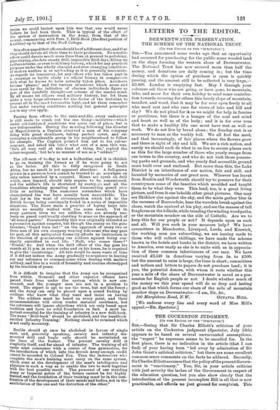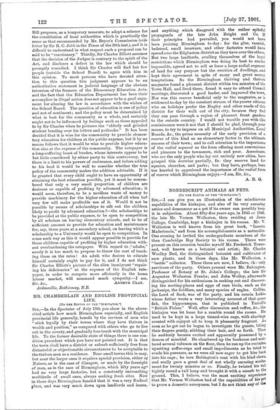THE COCKERTON JUDGMENT.
• [TO THE EDITOR OF THE "SPECTATOR."] Sut,—Seeing that Sir Charles Elliott's criticism of your article on the Cockerton judgment (Spectator, July 13th) appears to be based on several unwarranted assumptions, the "regret" he expresses seems to be uncalled for. In the first place, there is no indication in the article (that I can find) of your having been " led away by admiration of Sir John Gorst's satirical criticism," but there are some excellent common-sense comments on the facts he adduced. Secondly, Sir Charles Elliott assumes that the policy of the present Govern- ment is "reactionary." You, Sir, in your article criticise with just severity the 'aches of the Government in respect of the education question, but you also show clearly that the introduction of the present incomplete Bill is all that is now practicable, and affords no just ground for complaint. This
Bill proposes, as a temporary measure, to adopt a scheme for the constitution of local authorities which is practically the same as that recommended by Mr. Bryce's Commission (ride letter by Sir R. C. Jebb in the Times of the 20th inst.), and it is difficult to understand in what respect such a proposal can be said to be "reactionary." Thirdly, Sir Charles Elliott assumes that the decision of the Judges is contrary to the spirit of the Act, and discloses a defect in the law which should be promptly remedied. I think Sir Charles will find but few people (outside the School Board) to agree with him in this opinion. To most persons who have devoted atten-
tion to this question this judgment appears to be an authoritative statement in judicial language of the obvious intention of the framers of the Elementary Education Acts, and the fact that the Education Department has been their accomplice in illegal action does not appear to be a good argu- ment for altering the law in accordance with the wishes of the School Board. The question of education is one of policy and not of sentiment; and the policy must be determined by what is best for the community as a whole, and certainly ought not to be influenced by feelings such as those appealed to by Sir Charles when he pictures the "elderly and grizzled student bending over his letters and pothooks." It has been decided that it is wise for the community to provide elemen- tary education for children at the public expense, but it by no means follows that it would be wise to provide higher educa- tion also at the expense of the community. The ratepayer is a long-suffering beast of burden, whose interests appear to be but little considered by either party to this controversy, but there is a limit to his powers of endurance, and before adding to his load it would be well to consider whether the true policy of the community makes the addition advisable. If it be granted that every child ought to have an opportunity of obtaining the best education possible, yet it must be remem- bered that only a very small proportion of children are desirous or capable of profiting by advanced education; it would seem, therefore, to be a needless waste of money to provide machinery for the higher education of all when but very few will make profitable use of it. Would it not be possible by means of scholarships to sift out the children likely to profit by advanced education ?—the scholarships to be provided at the public expense, to be open to competition by all scholars on leaving elementary schools, and to be of sufficient amount to provide for education and maintenance for, say, three years at a secondary school, on leaving which a scholarship to a University would be open to competition. In some such way as this it would appear possible to provide for those children capable of profiting by higher education with- out overburdening the ratepayer. With regard to ,"adults," surely it is too much to propose to throw the cost of teach- ing them on the rates ! An adult who desires to educate himself certainly ought to pay for it, and I do not think Sir Charles Elliott's picture of the alien immigrant "repair- ing his deficiencies" at the expense of the English rate- payer, in order to compete more efficiently in the home labour market, will command much sympathy.—I am,



































 Previous page
Previous page